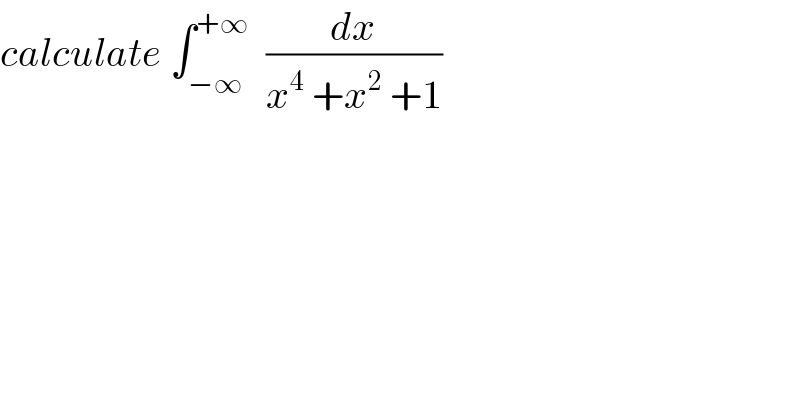
Question and Answers Forum
Question Number 67310 by mathmax by abdo last updated on 25/Aug/19

Commented by mathmax by abdo last updated on 25/Aug/19
![let I =∫_(−∞) ^(+∞) (dx/(x^4 +x^2 +1)) ⇒I =2 ∫_0 ^(+∞) (dx/(x^4 +x^2 +1)) we have x^4 +x^2 +1 =(x^2 +1)^2 −2x^2 +x^2 =(x^2 +1)^2 −x^2 =(x^2 −x+1)(x^2 +x+1) ⇒ I =2 ∫_0 ^(+∞) (dx/((x^2 +x+1)(x^2 −x+1))) let decompose F(x) =(1/((x^2 +x+1)(x^2 −x+1))) F(x) =((ax+b)/(x^2 +x +1)) +((cx+d)/(x^2 −x+1)) F(−x)=F(x) ⇒((−ax+b)/(x^2 −x+1)) +((−cx+d)/(x^2 +x+1)) =F(x) ⇒ c=−a and d=b ⇒F(x) =((ax+b)/(x^2 +x+1)) +((−ax+b)/(x^2 −x +1)) F(0) =1 =2b ⇒b =(1/2) F(1) =(1/3) =((a+b)/3) +b−a ⇒3 =a+b+3b−3a =−2a+2 ⇒1 =−2a ⇒ a=−(1/2) ⇒ F(x) =((−(1/2)x+(1/2))/(x^2 +x+1)) +(((1/2)x+(1/2))/(x^2 −x +1)) =(1/2){((−x+1)/(x^2 +x+1))+((x+1)/(x^2 −x +1))} ⇒∫_0 ^(+∞) F(x)dx =−(1/2) ∫_0 ^∞ ((x−1)/(x^2 +x+1))dx +(1/2)∫_0 ^∞ ((x+1)/(x^2 −x+1))dx =−(1/4)∫_0 ^∞ ((2x+1−3)/(x^2 +x+1))dx +(1/4)∫_0 ^∞ ((2x−1+3)/(x^2 −x +1))dx =(1/4)[ln∣((x^2 −x+1)/(x^2 +x+1))∣]_0 ^(+∞) +(3/4)∫_0 ^∞ (dx/(x^2 −x +1)) +(3/4)∫_0 ^∞ (dx/(x^2 +x+1)) =0 +(3/4) ∫_0 ^∞ (dx/(x^2 −x+1)) +(3/4)∫_0 ^∞ (dx/(x^2 +x +1)) ∫_0 ^∞ (dx/(x^2 −x +1)) =∫_0 ^∞ (dx/((x−(1/2))^2 +(3/4))) =_(x−(1/2)=((√3)/2)u) (4/3) ∫_(−(1/(√3))) ^(+∞) (1/(u^2 +1))((√3)/2)du =(2/(√3))[arctanu]_(−(1/(√3))) ^(+∞) =(2/(√3)){ (π/2) +arctan((1/(√3)))}=(2/(√3)){(π/2)+(π/6)} =(2/(√3)){((2π)/3)} =((4π)/(3(√3))) ∫_0 ^∞ (dx/(x^2 +x +1)) =∫_0 ^∞ (dx/((x+(1/2))^(2 ) +(3/4))) =_(x+(1/2)=((√3)/2)u) (4/3) ∫_(1/(√3)) ^∞ (1/(u^2 +1))((√3)/2)du =((2(√3))/3)[arctan(u)]_(1/(√3)) ^(+∞) =(2/(√3)){(π/2)−(π/6)}=(2/(√3)){(π/3)} =((2π)/(3(√3))) ⇒ ∫_0 ^∞ F(x)dx =(3/4)×((4π)/(3(√3))) +(3/4)×((2π)/(3(√3))) =(π/(√3)) +(π/(2(√3))) =(3/2)(π/(√3)) we have I =2 ∫_0 ^∞ F(x)dx =((3π)/(√3)) =π(√3)](Q67339.png)
Commented by MJS last updated on 26/Aug/19

Answered by Kunal12588 last updated on 25/Aug/19
![(1/2)∫((2/x^2 )/(x^2 +1+(1/x^2 )))dx=(1/2)∫((1+(1/x^2 ))/(x^2 +(1/x^2 )+1))dx−(1/2)∫((1−(1/x^2 ))/(x^2 +(1/x^2 )+1))dx (x+(1/x))=t⇒(1−(1/x^2 ))dx=dt (x−(1/x))=u⇒(1+(1/x^2 ))dx=du x^2 +(1/x^2 )+1=t^2 −1 and x^2 +(1/x^2 )+1=u^2 +3 I=(1/2)∫(du/(u^2 +3))−(1/2)∫(dt/(t^2 −1)) =(1/2)×(1/(√3))×tan^(−1) ((u/(√3)))−(1/2)×(1/2)ln∣((t−1)/(t+1))∣+C =(1/(2(√3))) tan^(−1) (((x^2 −1)/(x(√3))))−(1/4) ln∣((x^2 −x+1)/(x^2 +x+1))∣+C I_1 =∫_(−∞) ^(+∞) (dx/(x^4 +x^2 +1))=[I ]_(−∞) ^(+∞) lim_(x→+∞) I = (1/(2(√3))) lim_(x→+∞) arctan((x/(√3))−(1/(x(√3))))−(1/4) lim_(x→+∞) ln∣((1−(1/x)+(1/x^2 ))/(1+(1/x)+(1/x^2 )))∣ = (1/(2(√3))) lim_(x→+∞) arctan((x/(√3))−(1/(x(√3))))−(1/4) lim_(x→+∞) ln∣1∣ = (1/(2(√3)))×(π/2)−0=(π/(4(√3))) lim_(x→−∞) I= (1/(2(√3))) lim_(x→−∞) arctan((x/(√3))−(1/(x(√3))))−0 =(1/(2(√3)))×((−π)/2)=−(π/(4(√3))) I_1 =(π/(4(√3)))+(π/(4(√3)))=(π/(2(√3)))](Q67329.png)
Commented by mathmax by abdo last updated on 25/Aug/19

Commented by Kunal12588 last updated on 26/Aug/19

Commented by mathmax by abdo last updated on 26/Aug/19

